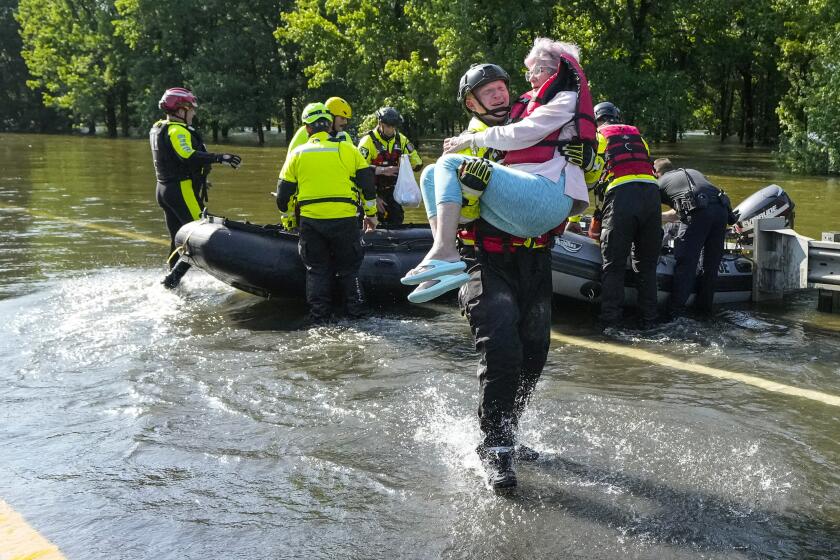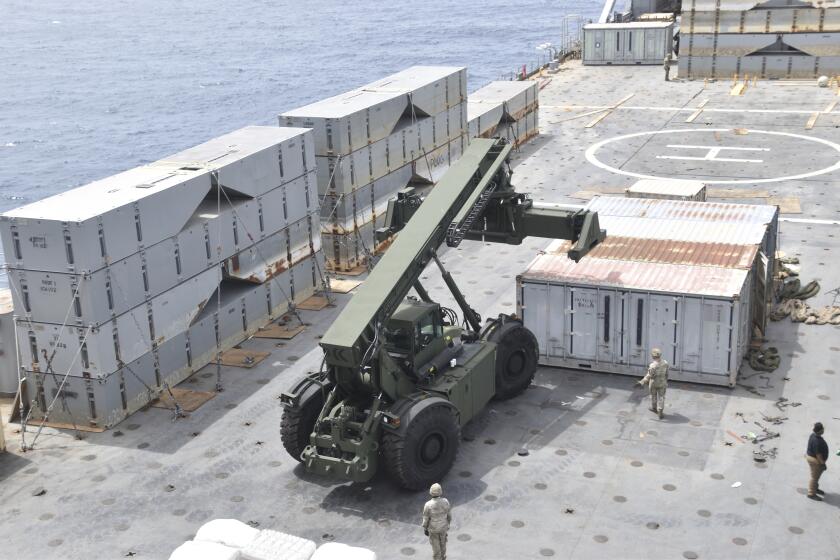At Nichols Trial, Two Questions Loom Large
When the last echo of closing argument fades in the federal courtroom here today, hanging in the air will be two fundamental questions about Terry L. Nichols and the bombing of the Oklahoma City federal building.
First, if Nichols did help Timothy J. McVeigh carry out the worst episode of American terrorism, what was his motive?
Second, why did the defense team put Nichols’ wife of seven years, the mother of two of his three children, on the witness stand, setting her up for a cross-examination by prosecutors that elicited some of the most damaging evidence against him yet?
The first of these questions is for the jury to decide, and the answer will not come without some soul-searching. There was no evidence during his trial that Nichols, although an avowed enemy of the U.S. government, ever told anyone that a federal installation should be targeted and destroyed, much less the little-known Alfred P. Murrah Federal Building in Oklahoma City.
In contrast, McVeigh, 29, bragged to his friends of his plans, wrote them about his activities, left a trail of telephone credit-card bills and retained two computer files promising to “rip the bastards’ heads off” to avenge the 1993 FBI assault on a religious compound in Waco, Texas.
Nichols, 42, an Army buddy of McVeigh, did not go with him to rent the bright yellow Ryder truck used in the attack, and he was at home in Kansas on the morning of April 19, 1995, when the bomb exploded and killed 168 people.
And although Nichols was also upset by the government actions at Waco, prosecutors presented no evidence in his trial that he joined McVeigh in choosing the two-year anniversary of the Waco attack to strike the Murrah building.
The second question, although not expected to be at the heart of the jurors’ deliberations when they begin meeting behind closed doors in Denver’s U.S. District Courthouse this week, is mystifying nevertheless.
The Nichols defense team, led by attorney Michael E. Tigar, decided against putting their client on the witness stand in an attempt to save him from McVeigh’s fate. Convicted by a separate jury, McVeigh in June was sentenced to death.
The Nichols defense clearly saw the risk of making their client available to prosecutors for cross-examination.
But Tigar also was trying to persuade the jury that Nichols was not only not involved with McVeigh but that he was going about establishing a new business and resettling his family in the middle of Kansas--and thus was too busy and too disinterested to join in McVeigh’s crusade.
To achieve that goal, Tigar offered up Marife Nichols. She came through fine under questioning by friendly defense lawyers Wednesday, testifying about their new home in Herington, Kan., and her husband’s promise in the months before the bombing to break off his friendship with McVeigh.
But when Tigar’s chief assistant, Ron Woods, turned to the judge and said, “I pass the witness, your honor,” she became putty in the hands of prosecutors. She was the last witness for the defense--and the best for the prosecution.
“It was the biggest mistake of all,” said Andrew Cohen, a Denver attorney and legal analyst who, after watching both trials, was stunned at the defense’s eleventh-hour decision to put Marife Nichols on the stand. “I don’t know what they were thinking.”
What made it all the more startling is that the defense was aware that the government knew everything Marife Nichols would have to say that could help the prosecution.
For 36 days after her husband’s surrender in the bombing case, the FBI kept Marife Nichols hidden, moving her around to secret locations and shielding her from a lawyer as agents repeatedly searched the Nichols’ home and conducted a series of interviews centered on her husband and McVeigh.
Cohen noted that federal law prohibits prosecutors from calling a spouse to testify against a spouse, so the only way for the government to get at Marife Nichols--and thus her husband--was for the defense to bring her before the jury.
“They didn’t have to do that,” he said of the Tigar team. “And now it is clear that they shouldn’t have.”
For instance, the government early in the trial struggled to prove that Nichols helped McVeigh mix the ammonium nitrate and fuel oil bomb at a Kansas lake, relying on two fishermen who saw a Ryder truck but no people there the morning before the blast.
Nichols has maintained that he spent that morning at a Ft. Riley, Kan., auction.
But when asked by prosecutors about her husband’s whereabouts, Marife Nichols testified under cross-examination that he was gone when she awoke, came home for lunch and then went to the auction.
Prosecutors also managed to get her to tell how her husband noticed a large fuel meter on the floor of their garage, a device the government says he and McVeigh used to help mix the bomb. “I have to do something about that!” she said he suddenly blurted just before surrendering to authorities.
Also damaging was her recall of a letter he received from McVeigh shortly before the bombing, reminding him that it was time to “shake and bake.” The phrase is one used often by Army ordnance experts working with explosives.
But even with this last-minute crucial evidence against Terry Nichols, the jury may still have problems with motive. Why would Nichols want to do this?
Although Nichols was upset about the Waco assault, even his Filipina wife admitted that his fervor was not nearly as intense as McVeigh’s.
“I did not see Terry being so mad about the Waco than McVeigh,” she testified in broken English.
As it turned out, McVeigh visited the site of the Branch Davidian compound during the FBI siege, and came away from Waco all the angrier. Later, he persuaded Nichols to join him on a second visit.
On April 19, 1993--two years to the day before the Oklahoma City bombing--McVeigh and Nichols were on a farm belonging to Nichols’ brother, James, in Decker, Mich.
Together, the three men stood in horror watching the television news coverage of the fire and smoke that ended the siege and ultimately left about 80 people dead in the compound. The second trip to Waco was canceled.
But the Terry Nichols jury never heard evidence about this crucial anecdote, because the trio--McVeigh and the Nichols brothers--unlike Marife Nichols, were never called to testify.
More to Read
Start your day right
Sign up for Essential California for news, features and recommendations from the L.A. Times and beyond in your inbox six days a week.
You may occasionally receive promotional content from the Los Angeles Times.







